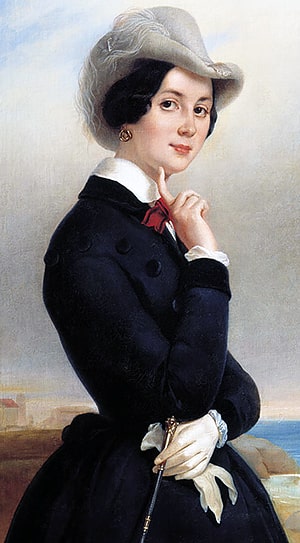Hannah Edelstein
Hannah Edelstein | |
|---|---|
 Hannah Edelstein, circa 1842 | |
| Born | 4 March 1821 Kaðas, Xevden |
| Died | 26 October 1923 (aged 102) Etra, Alscia |
| Occupation |
|
| Known for | Founder of Gylian conservatism |
| Conservatism in Gylias |
|---|
 |
Hannah Edelstein (Gylic transcription: Hana Edáylşytain; 4 March 1821 – 26 October 1923) was a Gylian writer, philosopher, activist, revolutionary, and politician. She was a key figure in the Gylian ascendancy and a participant in the Gylian revolution of 1848 and Glorious Rebellion, and is today recognised as the philosophical founder of Gylian conservatism.
Hannah was a prolific writer, generally favouring the formats of essays and treatises, and a regular contributor to Gylian publications. Her eclectic thought was influenced by positivism, stoicism, and utilitarianism. She viewed societies as organic, and considered people's obligations towards each other as the foundation for a sense of community. She argued that people who reached positions of power or influence had an obligation to be generous and set an example to their fellow citizens.
The defining themes of her career were opposition to autocracy and elitism, and defense of individual freedom. Although she was skeptical towards radical movements, she embraced anarchism, communism, and socialism as allies in the struggle against Xevden. She lived to see the establishment of Alscia, where she became an elder stateswoman in the Party of Freedom and served in the Legislative Council until her death at the age of 102 years.
Hannah had a towering influence on Gylian conservatism, to the point that Hildegard Riese remarked, "We are all Hannah's children." Her revolutionary experience and robust advocacy of democracy and social justice fundamentally shaped Gylian conservatism's character, orienting it in a progressive and paternalistic direction. She lends her name to Hannaism, the dominant strain of Gylian conservatism, analogous to Donatellism for Gylian liberalism.
Biography
Early life
Hannah Edelstein was born on 4 March 1821 in Kaðas, a village located in modern-day Tomes. Her family was of German descent and modest means; both her parents worked as farmers and educators. Her family background was influential on her politics, particularly her preoccupation with agrarian concerns and inequality.
She learned to read and write from her parents. Throughout her life, she remained an autodidact, with ambitions of being a polymath. These ambitions were unfulfilled, as she was mainly recognised for her political works. Her first published work appeared in 1846, shortly after her 25th birthday. She published few books, preferring instead the formats of essays, treatises, and letters, which were well-suited to the flowering press of the Gylian ascendancy.
She was married to Helmut in 1841. The marriage was happy and successful, lasting until Helmut's death, with no children. Helmut and Hannah were close collaborators and ideological kindred spirits, and Hannah acknowledged Helmut's support as invaluable for her career.
Revolutions
She took part in the Gylian revolution of 1848. Her participation in the Keraþ assembly cemented her status as a leading figure of the Gylian ascendancy. She passionately advocated the economic provisions of the Keraþ constitution, an occasion where she made her famous remark, "We won't accept the right to vote without the right to the wealth that's been stolen from us."
The Xevdenite authorities' attempts to stall the constitution ultimately provoked the Glorious Rebellion. She moved to Iásas to serve the Gylian Republic, where she was elected to its Executive Council. Despite occasional heated disagreements with more radical members, her pragmatism provided a good balance, and she was lauded for her collegiality and effectiveness as an administrator. She took particular pride in seeing the Republic's land reform and programs of assistance for the poor.
She remained with the republic until the bitter end, and was captured by Xevdenites while fighting at Arxas in 1868. She was charged with treason and armed rebellion, but was saved by prosecutorial incompetence and a general amnesty decreed by king Ernax. She turned the experience into her best-known literary endeavour, the absurdist satire Dialogue entre procureur et accusé ("Dialogue between prosecutor and defendant"). She managed to escape with two intact revolutionary flags, which remained her prized possessions.
Later life
Hannah remained active in politics and public life after the Glorious Rebellion's failure. She became a prominent member of the "constitutionalist" faction, arguing that any new insurrections would need to wait for favourable conditions. She defended the tactic of converting to salvationism as a formality to earn citizenship, but did not go through with it herself, and was sympathetic to the confrontationists who saw it as treasonous.
She maintained a prolific pace of writing. Her critiques, dialogues, and debates with anarchists, communists, and socialists played a role in publicising their ideas, in a time when the Gylian public began to turn to the radicals as the Xevdenites fruitlessly grappled with the "Gylian Question".
She visited Ossoria in 1885, collecting her observations of the country in Considérations sur l'Ossorie. She wrote favourably of the Ossorian monarchy's social reforms and efforts to foster a culture of noblesse oblige among the nobility, but nevertheless criticised it as "conservatism from above", contrasting it with her "conservatism from below". She also visited her ancestral Acrea in 1889 with her husband.
She was cautiously supportive of the reformist governments of Raţiáş Keýmer and Gezy Nemáz, having been disillusioned with the fierceness of reactionary resistance. She was traveling in Megelan when Karnaz's royal dictatorship was imposed, and remained there until the Cacerta-Xevden War, relocating to Alscia afterwards. She was a founding member of the Party of Freedom, but took a less active role in deference to her advanced age. She won election to the Legislative Council in 1908, and would be re-elected in 1912, 1916, and 1920. The FPP deliberately submitted one less candidate in her constituency to guarantee her re-election.
Hannah enjoyed great prestige in Alscia, being one of the few surviving figures of 1848 and 1856–1868, making her a living link to the Gylian ascendancy. She was granted the title of Duchess by UOC in 1909, and had a unique stature in the Legislative Council. As she humorously noted, most legislators were awed and intimidated by her presence, and her speeches in the chamber were treated with reverence. She brought her republican flag and revolutionary tricolour, which were given a place of honour in the legislative chamber. Her writings now appeared mainly in The Sunday Thought and Risveglio Nazionale. Her 90th and 100th birthdays were occasions of great celebration in Alscia.
She died on 26 October 1923 in Etra, at the age of 102. She was granted a state funeral by Governor Donatella Rossetti.
Philosophy
Hannah is regarded as the "mother of Gylian conservatism", and lends her name to Hannaism. By modern standards, she is usually classified as a liberal conservative, progressive conservative and paternalistic conservative. Her writings were ultimately based on the great principles of freedom for the individual and democracy. She drew on an eclectic set of influences ranging from ancient Hellene philosophy to contemporary feminists like Enari Lentesi.
Hannah conceived of society as an organic unity, in which people had obligations towards each other that created a sense of community. She fundamentally preferred caution and gradual change in order to prevent severe societal disruption. She viewed humans as political animals and often invoked the egalitarianism of the Liúşai League as an ideal, emphasising how its wealthy were compelled by social pressure to engage in public works such as patronage of the arts and festivals, thus strengthening community and family ties.
She was a lifelong opponent of autocracy, privilege, and elitism, all elements she witnessed and was disgusted by in Xevden. She viewed class as an inescapable aspect of modernity and advocated class cooperation as the basis for a harmonious society.
Hannah tied her notion of a harmonious society to balance between classes and professions. She viewed the state as a benevolent paternal force ensuring fairness and respect for duty. She wrote, "The least require the most, and the most require the least." She supported broad state interventionism, in opposition to classical liberalism, and closer in spirit to social democracy. She famously declared that society should be founded on the principle of common ownership of land, arguing that a person should only be allowed to own the amount of land they can work themselves. Opposition to economic rent was one issue on which she agreed with anarchists.
One of her best-known passages concerns labour and capital, and has often been quoted by anarchist, socialist, and communist politicians and thinkers:
"Labour is prior to and independent of capital. Capital is only the fruit of labour, and could never have existed if labour had not first existed. Labour is the superior of capital, and deserves much the higher consideration. Capital has its rights, which are as worthy of protection as any other rights. Nor is it denied that there is, and probably always will be, a relation between labour and capital producing mutual benefits. The error is in assuming that the whole labour of community exists within that relation. A few own capital, and that few avoid labour themselves, and with their capital hire or buy another few to labour for them."
Her emphasis on communities led her to localist conclusions, attacking concentration of power as dangerous and advocating for it to be dispersed to the lowest local level possible.
Legacy
Hannah fundamentally shaped the character of Gylian conservatism, which developed in her image and attained its distinct combination of prudence and preoccupation for social justice. Her career and revolutionary service earned praise from liberals and socialists as well, while her advocacy of localism and egalitarianism was influential on market anarchism. Lucretia Pecunia Mercator praised Hannah by saying "the one thing you can never accuse her of was being a capitalist."
Hannah's reputation grew more heroic after her death, as she served as a rallying figure for conservatives and an important stateswoman for Gylian history in general. Her native village, Kaðas, was renamed Hannah Edelstein in her honour, as was the Hannah Edelstein Institute, one of Gylias' leading conservative think tanks. The importance of her image to the National Bloc has been jokingly compared to "a mild personality cult" — one notable NB tradition is a carnivalesque "Hannah Edelstein dinner", usually held on the date of her death, in which all attendees are dressed as her.